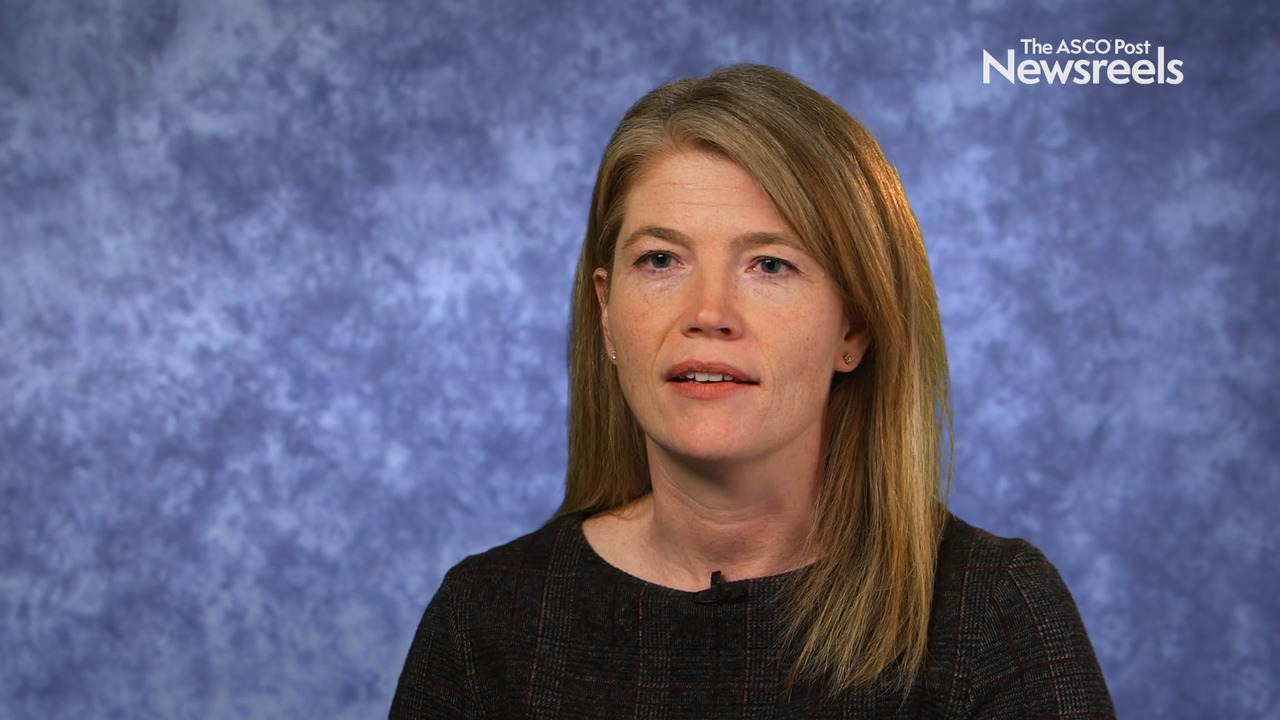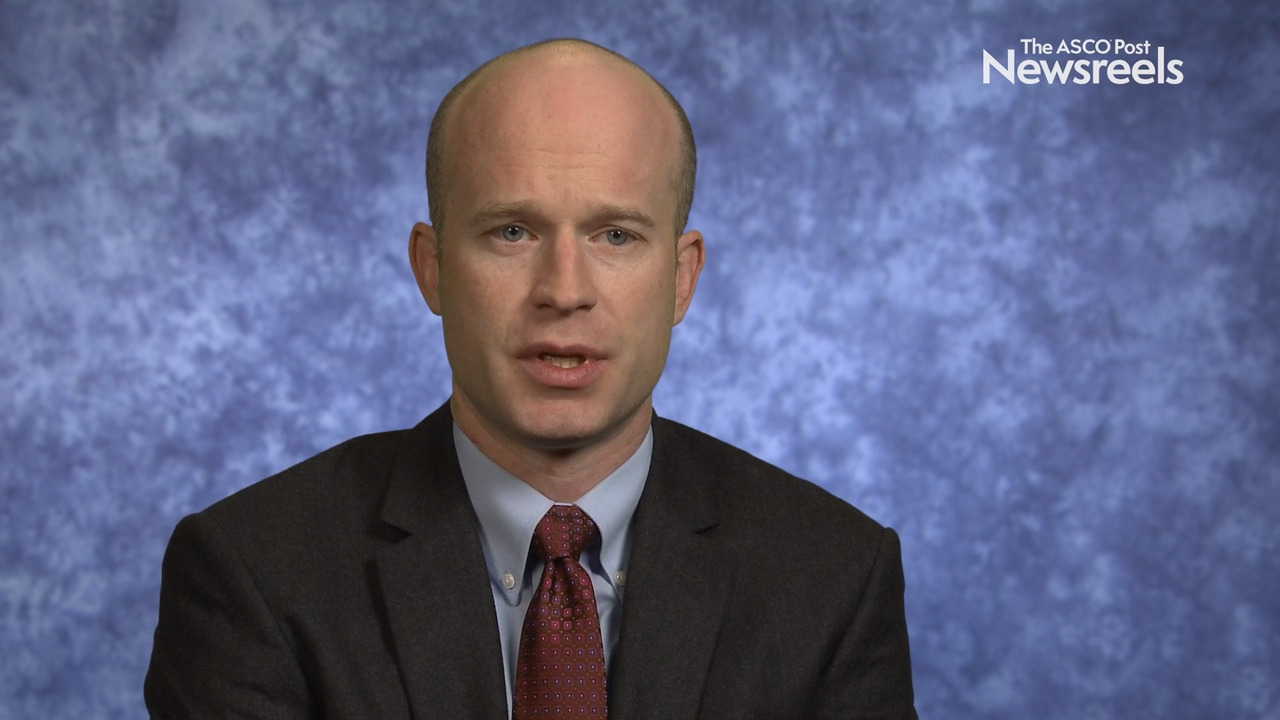Expert Point of View: Kunle Odunsi, MD, PhD
THE DISCUSSANT of the abstract was Kunle Odunsi, MD, PhD, Cancer Center Deputy Director, Chair of the Department of Gynecologic Oncology, and Executive Director of the Center for Immunotherapy, at Roswell Park Comprehensive Cancer Center, Buffalo, New York. He emphasized the large number of...
Biologic Age and Elevated Risk of Breast Cancer
Biologic age—a DNA-based estimate of a person’s age—may be associated with the development of breast cancer, according a report published by Jacob K. Kresovich, PhD, of the National Institute of Environmental Health Sciences (NIEHS), and colleagues in the Journal of the National Cancer Institute.1...
Vaccine Plus Trastuzumab in Preventing Recurrence of HER2–Low-Expressing Breast Cancer
IN HIGH-RISK patients with breast cancer and low expression of HER2 (HER2 low), a peptide vaccine targeting HER2, combined with granulocyte-macrophage colony-stimulating factor (GM-CSF), and given concurrently with trastuzumab, may help to prevent recurrence. Final analysis of a randomized phase...
Advanced HER2-Positive Breast Cancer: All Eyes on These Novel Agents
NEW AGENTS for the treatment of advanced HER2-positive breast cancer should be coming soon to your clinic, according to Sara A. Hurvitz, MD, Director of the Breast Cancer Clinical Research Program and Associate Professor of Medicine at the David Geffen School of Medicine at the University of...
American College of Physicians Issues Guidance Statement for Breast Cancer Screening in Average-Risk Women
Average-risk women between the ages of 50 and 74 who have no symptoms for breast cancer should undergo breast cancer screening with mammography every other year, the American College of Physicians (ACP) has recommended in a new evidence-based guidance statement published by Qaseem et al...
Final Overall Survival Results With Fulvestrant Plus Anastrozole in Metastatic Breast Cancer
As reported in The New England Journal of Medicine by Mehta et al, the final overall survival results of the phase III SWOG S0226 trial show that the addition of first-line fulvestrant to anastrozole was associated with improved overall survival in postmenopausal women with hormone...
FDA Expands Palbociclib Indication in HR-Positive, HER2-Negative Breast Cancer to Include Male Patients
Today, the U.S. Food and Drug Administration (FDA) extended the indication of palbociclib (Ibrance) capsules in combination with specific endocrine therapies for hormone receptor (HR)–positive, HER2-negative advanced or metastatic breast cancer to include male patients. “Today, we are...
AACR 2019: Does Primary Tumor Surgery Increase Survival in Patients With Advanced HER2-Positive Breast Cancer?
Surgery was associated with higher survival rates for patients with HER2-positive stage IV breast cancer compared with those who did not undergo surgery, according to results presented by Mudgway et al at the American Association for Cancer Research (AACR) Annual Meeting (Abstract 4873). Between...
FDA Pipeline: Mammography Policies, Designations for Leukemias and Myelodysplastic Syndrome
This week, the U.S. Food and Drug Administration (FDA) announced policy changes to modernize mammography policies and issued a Breakthrough Therapy designation, an Orphan Drug designation, and an investigational new drug application. FDA Advances Policy Changes to Modernize Mammography Services...
Expert Point of View: Matthew P. Goetz, MD
“WHAT’S IMPORTANT for clinicians to take away from this analysis is that there is clearly zero benefit of atezolizumab/nab-paclitaxel in patients with programmed cell death ligand 1 (PD-L1)-negative disease. In PD-L1–positive patients, the combination improves progression-free survival and overall ...
IMpassion130 Substudy: Atezolizumab/Nab-Paclitaxel Survival Benefits Limited to PD-L1–Positive Triple-Negative Breast Cancer
THE PHASE III IMpassion130 trial, first reported at the European Society for Medical Oncology (ESMO) 2018 Congress1 and published in The New England Journal of Medicine,2 found that the combination of front-line atezolizumab plus nab-paclitaxel significantly improved disease-free and overall...
FDA Grants Accelerated Approval to Atezolizumab/ Nab-paclitaxel in Triple-Negative Breast Cancer
ON MARCH 8, the U.S. Food and Drug Administration (FDA) granted accelerated approval to atezolizumab (Tecentriq) plus nab-paclitaxel (Abraxane) for the treatment of adults with unresectable, locally advanced or metastatic, PD-L1–positive triple-negative breast cancer. PD-L1 status is determined by...
American Society of Breast Surgeons Recommends Genetic Testing for Newly Diagnosed Patients With Breast Cancer
IN A MOVE that is a significant departure from current testing recommendations, the American Society of Breast Surgeons (ASBrS) recommends that genetic testing be available to all individuals newly diagnosed with breast cancer.1 The new recommendations expand on common restrictions by the National...
Trastuzumab Biosimilar for HER2-Overexpressing Breast Cancer
ON DECEMBER 14, 2018, trastuzumab-pkrb (Herzuma) was approved as a biosimilar to trastuzumab for patients with HER2-overexpressing breast cancer.1 Trastuzumab-pkrb is indicated for adjuvant treatment of HER2-overexpressing breast cancer and metastatic HER2-overexpressing breast cancer.2 Health-care ...
Patient Preferences for Oncologist and Primary Care Provider Roles After Initial Breast Cancer Treatment
In a study reported in the Journal of Oncology Practice, Radhakrishnan et al found that the level of involvement of medical oncologists and primary care physicians during initial cancer care in women with early-stage breast cancer affected patients’ preference for provider roles after initial ...
Breast Density Assessment Variation by Screening Modality
Fewer women are assigned to a dense-breast category when evaluated with advanced mammographic screening technologies compared to standard digital mammography, according to a new study published by Gastounioti et al in Radiology. Density Assessment A woman’s breast density is assessed during ...
Genomic Testing Associated With Lower Health-Care Costs in Patients With High-Risk Breast Cancer
New research published by Dinan et al in JNCCN—Journal of the National Comprehensive Cancer Network provides evidence that genomic recurrence score testing using the 21-gene assay is associated with decreased cancer care costs in real-world practice among certain patients with breast...
Artificial Intelligence vs Radiologists in Breast Cancer Detection With Digital Mammography
In a study reported in the Journal of the National Cancer Institute, Rodriguez-Ruiz et al found that a stand-alone artificial intelligence (AI) system had accuracy comparable to an average breast radiologist in detecting breast cancer using digital mammography. Study Details In the retrospective...
Melinda L. Telli, MD, on NCCN Guidelines Updates for HR-Positive, HER2-Negative Early-Stage Breast Cancer
Melinda L. Telli, MD, of the Stanford Cancer Institute, discusses the various systemic therapies for patients with early-stage hormone receptor–positive, HER2-negative disease.
William J. Gradishar, MD, on HR-Positive, HER2-Negative Advanced Breast Cancer: NCCN Guidelines Updates
William J. Gradishar, MD, of the Robert H. Lurie Comprehensive Cancer Center of Northwestern University, discusses evidence-based first-line treatment options for patients with advanced hormone receptor–positive, HER2-negative breast cancer and toxicities associated with the various therapeutic options.
Validation Study of Several Models of Breast Cancer Risk
In a validation study reported in The Lancet Oncology, Terry et al found that the Breast and Ovarian Analysis of Disease Incidence and Carrier Estimation Algorithm model (BOADICEA) and the International Breast Cancer Intervention Study model (IBIS) were the best of 4 models tested for predicting...
Number of Pregnancies May Influence Breast Cancer Risk in Women With BRCA Mutations
Researchers have found the lower risk of breast cancer associated with multiple pregnancies and breastfeeding in the general population extends to those at the highest risk of breast cancer. These results were published by Terry et al in the JNCI Cancer Spectrum. Methods and Findings The...
Neratinib Plus Capecitabine Active Against HER2-Positive Breast Cancer Brain Metastases
In the phase II TBCRC 022 trial reported in the Journal of Clinical Oncology, Freedman et al found that the combination of neratinib and capecitabine was active against brain metastases in women with HER2-positive breast cancer. Modest activity of neratinib monotherapy had been found in previous...
Restarting My Life After Terminal Cancer
At the end of 2015, I was dying. I was just 50 years old and a wife and mother of 2 teenage boys. Twelve years earlier, I had been diagnosed with ductal carcinoma in situ in my left breast. Despite a modified radical mastectomy and removal of nearly all of the lymph nodes in my left underarm—which ...
Opioid Use Among Older Survivors of Colorectal, Lung, and Breast Cancers
In a linked Surveillance, Epidemiology, and End Results and Medicare study reported in the Journal of Clinical Oncology, Salz et al found that chronic opioid use varied by cancer among older cancer survivors. By 6 years after diagnosis, survivors were no more likely to be chronic opioid users...
Use of Specialized PET/CT to Assess Estrogen Receptor Status in Recurrent or Metastatic Breast Cancer
In a Korean study reported in The Lancet Oncology, Chae et al found that 16α-[18F]fluoro-17β-oestradiol (18F-FES) positron-emission tomography/computed tomography (PET/CT) may permit accurate reevaluation of estrogen receptor status in recurrent or metastatic breast cancer when repeat...
FDA Pipeline: Assay Approval, Breakthrough Designations for AI Technology and CLL, and More
In the past week, the U.S. Food and Drug Administration (FDA) approved a companion diagnostic assay, granted Breakthrough Device and Breakthrough Therapy designations, and extended the review period of a proposed treatment. The agency also published four draft guidances and one final guidance...
Addition of Preoperative Breast MRI to Standard Evaluation in Local Ductal Carcinoma in Situ
In a French phase III trial reported in the Journal of Clinical Oncology, Balleyguier et al found that the addition of breast magnetic resonance imaging (MRI) to standard radiologic evaluation did not improve surgical reintervention rates in women with ductal carcinoma in situ undergoing...
FDA Approves Trastuzumab-qyyp in HER2-Overexpressing Breast and Gastric Cancers
The U.S. Food and Drug Administration (FDA) has approved trastuzumab-qyyp (Trazimera), a biosimilar to trastuzumab (Herceptin), for the treatment of human epidermal growth factor receptor-2 (HER2)-overexpressing breast cancer and HER2-overexpressing metastatic gastric or gastroesophageal...
Subsequent Primary Neoplasms in Survivors of Adolescent and Young Adult Cancers
In a UK population-based cohort study (Teenage and Young Adult Cancer Survivor Study) reported in The Lancet Oncology, Bright et al found that subsequent primary neoplasms were most common in survivors of adolescent and young adult (AYA) breast, cervical, and testicular cancers, as well as Hodgkin...
Factors Influencing Conversion to Mastectomy in Ductal Carcinoma in Situ
In a prospective cohort clinical trial reported in JAMA Oncology, Constance D. Lehman, MD, PhD, and colleagues found that multiple factors, including magnetic resonance imaging (MRI) findings, played a role in conversion to mastectomy among women with ductal carcinoma in situ (DCIS) who were...
Outcomes With Dose-Intense Adjuvant Chemotherapy in Early Breast Cancer
In a patient-level meta-analysis reported in The Lancet, the Early Breast Cancer Trialists’ Collaborative Group found that an increased dose intensity of adjuvant taxane and anthracycline chemotherapy in early breast cancer was associated with a decreased risk of recurrence and death from breast...
We Need Better Screening Methods for Detecting Breast Cancer
MY BREAST CANCER was probably a decade in the making, although I only became aware that there might be a problem in 2014, when I noticed some slight pain in my left breast. A routine mammogram and ultrasound found benign cysts in my dense breasts, which most likely explained the pain, I was told,...
FDA Grants Accelerated Approval to Atezolizumab/Nab-Paclitaxel; Regular Approval Contingent on Confirmatory Trials
Today, the U.S. Food and Drug Administration (FDA) granted accelerated approval to atezolizumab (Tecentriq) plus nanoparticle albumin-bound (nab)-paclitaxel (Abraxane) for the treatment of adults with unresectable, locally advanced or metastatic, programmed cell death ligand 1 (PD-L1)-positive ...
Patients With Breast Cancer Provide Recommendations to Ease Financial Toxicity
A qualitative study yielded nine patient-driven recommendations across circumstances that include changes to insurance, supportive services, and financial assistance to reduce long-term, breast cancer–related economic burden. The study was published by Dean et al in Cancer. Unique...
FDA Pipeline: Updates on Treatments for Cervical Cancer, Myelofibrosis, Chemotherapy-Induced Nausea and Vomiting, and More
The FDA recently issued announcements on a Fast Track designation, a Priority Review, two supplemental new drug applications, an investigational new drug application, and a marketing clearance. The agency also released a safety communication on cancer-related surgery. Fast Track Designation for...
G. Travis Clifton, MD, on Breast Cancer and Disease Recurrence: Final Analysis From a Study of Nelipepimut-S, GM-CSF, and Trastuzumab
G. Travis Clifton, MD, of Brooke Army Medical Center, discusses phase IIb trial findings on nelipepimut-S plus GM-CSF with trastuzumab vs trastuzumab alone to prevent recurrences of high-risk, HER2 low-expressing breast cancer (Abstract 1).
Elizabeth A. Mittendorf, MD, PhD, on Breast Cancer Immunotherapy: Building on Recent Successes
Elizabeth A. Mittendorf, MD, PhD, of Dana-Farber Cancer Institute, discusses the encouraging data on atezolizumab plus nab-paclitaxel in the first-line setting for metastatic triple-negative breast cancer, and the potential benefits of combining immune checkpoint inhibitors with targeted treatment in breast cancer.
Neoadjuvant Palbociclib Plus Letrozole Reduces Ki67 Levels
In the neoadjuvant setting, adding palbociclib to letrozole significantly enhanced the suppression of malignant cell proliferation, as measured by Ki67 levels, in patients with primary estrogen receptor–positive breast cancer but did not increase the clinical response rate over 14 weeks, according ...
Long-Term Study Finds Axillary Radiotherapy Safe and Effective After Positive Sentinel Node Biopsy
Following identification of a positive sentinel lymph node, surgical axillary lymph node dissection and axillary radiation therapy provide comparable locoregional control and survival, according to a 10-year follow-up of the large European Organisation for Research and Treatment of Cancer AMAROS...
Biologic Age and Elevated Breast Cancer Risk
Biologic age—a DNA-based estimate of a person’s age—may be associated with development of breast cancer, according a report published by Kresovich et al in the Journal of the National Cancer Institute. Study Methods Scientists from the National Institute of Environmental Health...
More Data Show Small Benefit From Extended Endocrine Therapy
Two studies presented at the 2018 San Antonio Breast Cancer Symposium validated a small benefit of extending adjuvant aromatase inhibitor therapy beyond thestandard 5 years for postmenopausal women with hormone receptor–positive breast cancer. In a meta-analysis of 24,912 patients from 12...
Does Adjuvant Denosumab Improve DFS in Postmenopausal Women With Hormone Receptor–Positive Breast Cancer Receiving Aromatase Inhibitors?
As reported by Gnant et al in The Lancet Oncology, disease-free survival (DFS) was improved with adjuvant denosumab vs placebo in postmenopausal women with hormone receptor–positive, early-stage breast cancer receiving aromatase inhibitor treatment. A primary analysis of the phase III...
Can Cognitive Behavioral Therapy Improve Treatment-Induced Menopausal Symptoms in Survivors of Breast Cancer?
In a Dutch study reported in the Journal of Clinical Oncology, Atema et al found that an Internet-based cognitive behavioral therapy (iCBT) intervention improved treatment-induced menopausal symptoms in breast cancer survivors compared with a waiting list control group. In the study, 254 women...
2019 ASCO-SITC: Combination Immunotherapy for Breast Cancer With Trastuzumab and a HER2-Targeted Vaccine
After preclinical findings showed shared activity between trastuzumab and HER2-targeted vaccines, researchers evaluated adjvuant nelipepimut-S plus granulocyte-macrophage colony-stimulating factor (GM-CSF) with trastuzumab compared to trastuzumab with GM-CSF alone in patients with HER2...
FDA Approves Trastuzumab and Hyaluronidase-oysk for Subcutaneous Injection in Certain HER2-Positive Breast Cancers
On February 28, the U.S. Food and Drug Administration (FDA) approved trastuzumab and hyaluronidase-oysk (Herceptin Hylecta) for subcutaneous injection for the treatment of certain patients with HER2-positive early breast cancer (node-positive, or node-negative and estrogen receptor/progesterone...
Sacituzumab Govitecan-hziy in Heavily Pretreated, Metastatic Triple-Negative Breast Cancer
In a phase I/II trial reported in The New England Journal of Medicine, Bardia et al found durable responses with the antibody-drug conjugate sacituzumab govitecan-hziy in patients with heavily pretreated, metastatic triple-negative breast cancer. The monoclonal antibody sacituzumab targets the...
Addition of Pembrolizumab to Trastuzumab in PD-L1–Positive, Trastuzumab-Resistant, HER2-Positive Breast Cancer
In the phase II portion of a phase Ib/II trial reported in The Lancet Oncology, Loi et al found evidence of activity of pembrolizumab plus trastuzumab in programmed cell death protein ligand 1 (PD-L1)-positive, trastuzumab-resistant, HER2-positive advanced breast cancer. Study Details In the...
Expert Point of View: Carlos L. Arteaga, MD
CARLOS L. ARTEAGA, MD, Director of the Harold C. Simmons Comprehensive Cancer Center and Associate Dean of Oncology Programs at The University of Texas Southwestern Medical Center, Dallas, expressed some caution about the overall applicability of the findings of the PADDY trial. Primarily, he...
Prognostic Value of Disseminated Tumor Cells in Early Breast Cancer
IN THE PADDY TRIAL, involving more than 10,000 women with early invasive breast cancer, the presence of disseminated tumor cells at diagnosis or primary surgery was an independent prognostic factor for overall, disease-free, and distant disease–free survival. The study findings were presented at...




